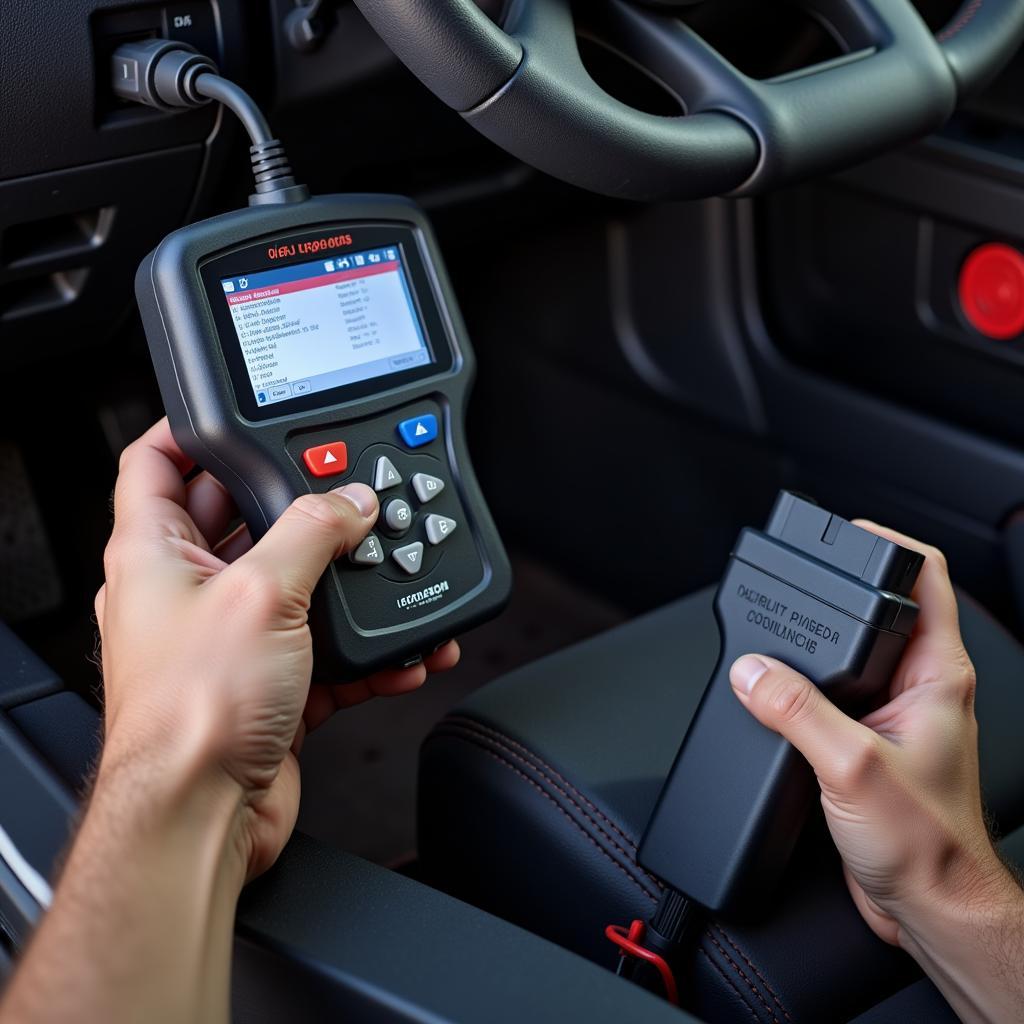Using a diagnostic tool on a car has become essential for both professionals and DIY enthusiasts. These powerful devices provide a window into your car’s computer system, revealing hidden issues and helping you understand its health. From identifying a simple sensor malfunction to pinpointing complex electrical problems, diagnostic tools are revolutionizing car repair and maintenance. This article will delve into the world of car diagnostic tools, exploring their capabilities, benefits, and how to use them effectively.
Understanding the Power of Car Diagnostic Tools
Car diagnostic tools, often referred to as OBD-II scanners, connect to your car’s onboard diagnostic port (OBD-II port), usually located under the dashboard. They communicate with the car’s electronic control unit (ECU), the brain of the vehicle, to retrieve diagnostic trouble codes (DTCs). These codes are standardized and provide clues about the nature and location of the problem. Some tools offer advanced features like live data streaming, allowing you to monitor various parameters in real-time, such as engine speed, coolant temperature, and oxygen sensor readings. This data can be invaluable for diagnosing intermittent problems or fine-tuning performance. You can find helpful resources and software related to car diagnostics, such as Delphi Diagnostics DS150E Cars and Trucks Software.
Are you interested in learning more about car diagnostics? Check out our Springs car diagnostic services.
How to Use a Diagnostic Tool on Your Car
Using a diagnostic tool might seem daunting, but the process is relatively straightforward. First, locate the OBD-II port on your car. Then, plug the diagnostic tool into the port and turn on the ignition. The tool will power on and establish communication with the ECU. Next, follow the on-screen instructions to read the DTCs. Once you have the codes, you can look them up online or in a repair manual to understand their meaning. Remember, while these tools are powerful, they only provide clues. Proper diagnosis still requires mechanical knowledge and experience. For those in Johannesburg, you can find valuable car diagnostic courses.
Choosing the Right Diagnostic Tool
Diagnostic tools range from basic code readers to advanced professional scanners. Basic code readers are affordable and ideal for DIYers who want to read and clear codes. Professional scanners offer more features, such as live data streaming, bi-directional control, and access to manufacturer-specific codes. Consider your needs and budget when selecting a tool. If you’re a serious DIYer or a professional, investing in a more advanced tool can save you time and money in the long run. You can find resources and software like Car Diagnostic Pro to help you with your car diagnostic needs.
Benefits of Using Diagnostic Tools
Using a diagnostic tool offers several benefits. Firstly, it can save you money on repairs by helping you identify problems early on. Secondly, it can help you avoid unnecessary repairs by providing accurate information about the issue. Thirdly, it can empower you to take control of your car’s maintenance and make informed decisions about repairs. Finally, understanding how to use a diagnostic tool can be a valuable skill, even if you’re not a professional mechanic. If you’re looking for visual aids, resources like car diagnostics outline vector white background might be helpful.
Conclusion
Using a diagnostic tool on a car is an invaluable skill for anyone who wants to understand and maintain their vehicle. These tools provide a powerful way to diagnose problems, save money on repairs, and take control of your car’s health. By understanding the basics of using a diagnostic tool, you can empower yourself to make informed decisions about your car’s maintenance and repairs.
FAQ
- What is an OBD-II port?
- What are DTC codes?
- How do I find the OBD-II port on my car?
- What is the difference between a basic code reader and a professional scanner?
- Can I fix my car myself using a diagnostic tool?
- Where can I find reliable information about DTC codes?
- What should I do if my diagnostic tool doesn’t work?
Need help with car diagnostics? Contact us on WhatsApp: +1(641)206-8880 or Email: [email protected]. We have a 24/7 customer support team ready to assist you. We also have other informative articles on our website, including resources on specific diagnostic software and training opportunities.



